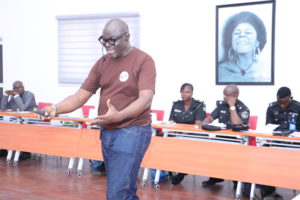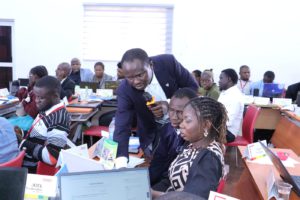A Physician at the National Hospital, Abuja, Dr Harazumi Bello, has urged Nigerians to adopt a healthy lifestyle and a good diet to avoid diabetes and its complications.
Bello, made the call in an interview with the News Agency of Nigeria on Saturday in Abuja on the occasion of the World Diabetes Day, which has “The Nurse and Diabetes” as the theme for 2020.
Annually celebrated on November 14 to raise global awareness and promote the importance of taking coordinated actions to confront diabetes as a critical global health issue, WDD is also aimed at prevention, complications and care for people living with the condition.
Diabetes is a chronic disease that occurs when the pancreas is no longer able to make insulin, or when the body cannot make good use of the insulin it produces.
According to the World Health Organisation, one in two people with diabetes in Africa do not know their status and nearly one in five COVID-19 deaths in Africa is linked to diabetes.
The world body added in a statement to mark the WDD that “this is particularly important in the African Region, where more than half of the people living with diabetes don’t know they have it, and many of those diagnosed are not well controlled.”
The NHA physician, therefore, advised people to cut down sugar and refined carbohydrates intake and engage in regular exercise, saying “people should do 30 minutes of a brisk walk per day at least five times in a week.’’
Bello also advised smokers to try and drop the habit as it could increase the risk of having diabetes, as well as avoid a sedentary lifestyle, stressing that “walk at least 3,000 steps daily.
“Drink water as primary and main beverage; lose weight if you’re overweight or obese, follow a low-carb diet, avoid large portion sizes whether or not you decide to follow a low-carb diet and eat high fibre diet.
“Minimise your intake of processed foods and check your blood sugar regularly.”
According to him, the risk or complications associated with type 1 and type 2 diabetes are more or less the same, apart from a few, the details of which mainly concern the health professionals.
Type 1 diabetes is a condition in which one immune system destroys insulin-making cells in the pancreas.
These are called beta cells. The condition is usually diagnosed in children and young people, so it used to be called juvenile diabetes.
Type 2 diabetes is a lifelong disease that affects the body from using insulin the way it should. People with type 2 diabetes are said to have insulin resistance.
People who are middle-aged or older are most likely to get this kind of diabetes, so it used to be called adult-onset diabetes.
Bello said some of the complications from type 1 and 2 diabetes included cardiovascular diseases such as angina, heart attack and stroke and nerve damage.
He said nerve damage could be a tingling sensation, numbness, burning sensation or pain that usually begins at the tips of the toes or fingers and gradually spreads.
He added that “complication can result to kidney damage, which can lead to kidney failure, eye damage which can lead to blindness, foot damage (injuries, blisters and infections) which can lead to amputation.
“Also, skin conditions – recurrent skin infections, very high blood sugar which can lead to coma or death and dementia, as well as depression.”
Bello said that the best way to manage diabetes was by constantly educating the patient on the condition and the need for drug adherence and regular follow up visits to the hospital.
“Also, adherence to other lifestyle modifications, including strict foot care to prevent injuries which can lead to amputation; in management of diabetes, the patient has a role as significant as that of the health professionals.
“Diabetic patients can live good lives devoid of major complications if they adhere to the advice of their health providers,’’ he said.








